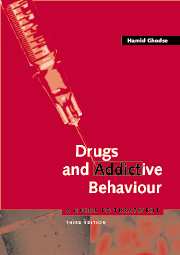Book contents
- Frontmatter
- Contents
- Preface
- Introduction
- 1 Drugs, addiction and behaviour
- 2 Drug dependence in the UK – and elsewhere
- 3 Drugs of abuse and dependence
- 4 Alcohol
- 5 Assessment
- 6 General measures of intervention
- 7 Specific methods of treatment
- 8 Complications of drug abuse and their treatment
- 9 Special problems
- 10 Follow-up and treatment outcome
- 11 Prevention of drug abuse
- 12 The law and drug control policies
- Appendices
- References and further reading
- Index
9 - Special problems
Published online by Cambridge University Press: 06 January 2010
- Frontmatter
- Contents
- Preface
- Introduction
- 1 Drugs, addiction and behaviour
- 2 Drug dependence in the UK – and elsewhere
- 3 Drugs of abuse and dependence
- 4 Alcohol
- 5 Assessment
- 6 General measures of intervention
- 7 Specific methods of treatment
- 8 Complications of drug abuse and their treatment
- 9 Special problems
- 10 Follow-up and treatment outcome
- 11 Prevention of drug abuse
- 12 The law and drug control policies
- Appendices
- References and further reading
- Index
Summary
The pregnant addict
Pregnancy
The antenatal care of the pregnant drug addict or drug abuser has exactly the same aims as for the nondrug-abuser – to keep the woman in good health for her own sake, and to give her the best chance of delivering a healthy child. Achieving these aims is often complicated not only by the pharmacological effects of the drugs the mother uses but also by her lifestyle.
To start with, the diagnosis of pregnancy and hence the initiation of antenatal care may be delayed because there is a high incidence of abnormal menstrual cycles and amenorrhoea during opiate administration, which often resolves when drug use is interrupted. Thus, it may happen that a woman who has become pregnant while temporarily abstinent assumes that her subsequent amenorrhoea is due to a resumption of drug-taking, and does not present to an antenatal clinic until well into her pregnancy, when her increasing weight and enlarging abdomen become apparent. This late presentation may be particularly disadvantageous for those living in poor environmental conditions and with poor nutrition who need the vitamin and mineral supplementation routinely provided during pregnancy. Others may attend antenatal clinics, but are frightened to admit their dependence and conceal it from obstetricians and others.
However, once aware of their pregnant condition, many drug addicts do approach their GP or another agency for advice. Their motivation to come off drugs may be high at this time because they are afraid that their new-born child will be taken from them, or at least placed on the Child Protection Register, if they are still taking drugs at the time of birth.
- Type
- Chapter
- Information
- Drugs and Addictive BehaviourA Guide to Treatment, pp. 315 - 348Publisher: Cambridge University PressPrint publication year: 2002



